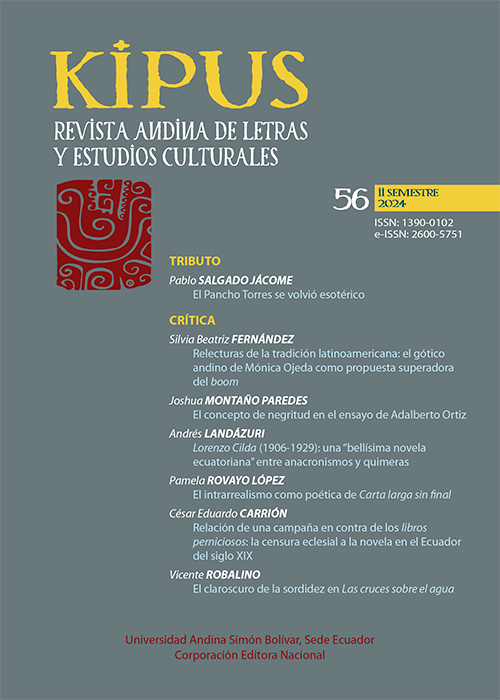Bolívar Echeverría’s Reflection on the Political-Aesthetic Dimension of Art in Dialogue with Walter Benjamin
DOI:
https://doi.org/10.32719/13900102.2024.56.9Keywords:
art, culture, identity, evanescent, vanguards, industry, cultural, critical thought,, Bolívar Echeverría, Walter Benjamin, XXth centuryAbstract
This essay presents an approach to the concept of art formulated by Bolívar Echeverría in light of his dialogue with Benjamin’s concept of art. The work is divided in three parts. The first addresses Echeverría’s aesthetic proposal and his reflection on the self-critical dimension of social life, which allows us to propose the existence of a notion of “evanescent art.” In the second part, it is proposed as a hypothesis that in Echeverría the need arose to relocate the emphasis of his aesthetic proposal based on the dialogue he established with the notions of auratic and non-auratic art and the interpretation of the meaning of the artistic avant-garde of the XXth century developed by Benjamin in his essay The Work of Art in the Age of Technical Reproducibility. The last part presents the reflection that Echeverría elaborated on the destiny of contemporary art, taking as reference the controversy between Adorno, Horkeheimer, on the one hand, and Benjamin, on the other.
Downloads
References
Benjamin, Walter. 2003 [1935]. La obra de arte en la época de su reproductibilidad técnica. Traducido por A. E. Weikert. Ciudad de México: Editorial Ítaca.
Benjamin, Walter. 2004. El autor como productor. Traducido por B. Echeverría. Ciudad de México: Editorial Ítaca (discurso escrito y leído en 1934).
Echeverría, Bolívar. 1986. “El Materialismo de Marx”. En Discurso crítico de Marx. Ciudad de México: Ediciones Era.
Echeverría, Bolívar. 1997. “Identidad Evanescente”. En Las ilusiones de la Modernidad. Ciudad de México: UNAM / El Equilibrista.
Echeverría, Bolívar. 1998. El “valor de uso: ontología y semiótica”. En Valor de uso y utopía. Ciudad de México: Siglo XXI Editores.
Echeverría, Bolívar. 2009. “De la academia a la bohemia y más allá”. Theoría, Revista del Colegio de Filosofía (19): 47-60. DOI: https://doi.org/10.22201/ffyl.16656415p.2009.19.354
Echeverría, Bolívar. 2010. Definición de la cultura. Ciudad de México: Fondo de Cultura Económica/ Editorial Ítaca.
Horkheimer, M., y T. W. Adorno. 1998 [1944]. “La industria cultural. Ilustración como engaño de masas”. En Dialéctica de la Ilustración. Fragmentos filosóficos. Traducido por J. J. Sánchez, 165-212. Barcelona: Trotta.
Manifiesto Suprematista. http://blogs.fad.unam.mx/asignatura/raquel_garcia/wp-content/uploads/2015/03/Manifiesto-Suprematista-Casimir-Malevich.pdf.
Published
How to Cite
Issue
Section
License

This work is licensed under a Creative Commons Attribution-NonCommercial-ShareAlike 4.0 International License.







.png)
